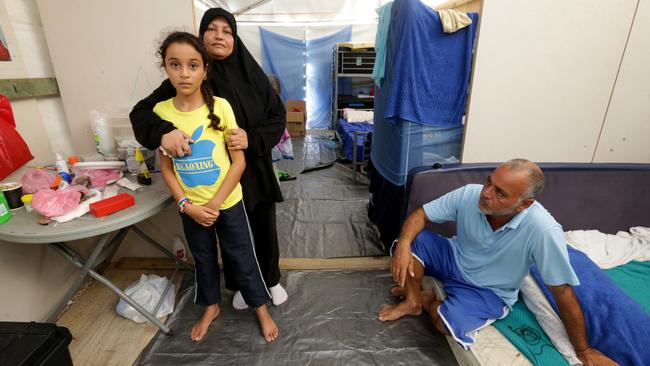School boycott flashpoint between refugees and Nauru islanders
Asylum-seeker children are missing out on school in Nauru because of a boycott — sanctioned by their parents.

Refugee and asylum-seeker children are missing out on school in Nauru because of a boycott — sanctioned by their parents — that is inflaming tensions with the Nauruan community.
Following the July closure of an Australian-run school at the refugee processing centre, parents and students are complaining about poor standards and lack of airconditioning at the Nauruan schools. Some of the refugee and asylum-seeker parents clearly hope to force the Australian government to reopen the centre school.
Cultural differences are at play.
“They go to the toilet in bare feet,” one asylum-seeker girl complained.
When The Australian visited Nauru’s Refugee Processing Centre 3 this week — where asylum-seeker and some refugee families are housed — at least a dozen school-age children were at home with their families.
All three centres in Nauru are now open. Families are free to come and go, including to local schools. But many do not.
“I won’t go to school in Nauru,” said nine-year-old Iraqi refugee Hiba al Sabah. “I went for a week but didn’t like it.”
Her parents, Dihya and Khawla, say they cannot force her to go and also insist that the centre school was better. “The (Nauruan) school is very dirty and very hot,” says father Dihya. “She don’t like.”
Nearby nine-year-old Salam, from Syria, and his 11-year-old brother Salar, are also playing truant with the approval of their father. Away from the centres, in independent refugee housing, there are similar stories. Iranian refugee Rasool Bmohavi and his wife, Farideh, had their daughters Asia, 8, and Masomah, 10, home for the day.
Worried about bullying, Rasool had a meeting scheduled later that day with the teacher.
Masomah showed us some scratches on her leg, claiming a Nauruan boy had been teasing her and knocked her over.
These tensions are playing out across the island where refugee and asylum-seeker families claim to be short-changed — and Nauruans are insulted.
“Tensions or not I think we need to all learn to live together and use the same facilities,” says David Adeang, Nauru’s Justice and Finance Minister.
“The thing with the school at the centre was that there was a very low student to teacher ratio, there was airconditioning in all the classrooms, and when you take them out of that environment there’s going to be some pushback, that’s understandable.”
A spokesman for Immigration Minister Peter Dutton is “committed to the integration” of all children into the island schools.
“Enrolment and engagement in Nauru schools, and learning alongside Nauruan children, promotes play and relationship development and is an important step for transferee children and their parents, aiding them in settling in and making new friendships within the local Nauru community,” the spokesman said.
However, Nauruan officials concede they already had a local problem with punctuality and truancy. Meetings and counselling sessions are being held with parents, and sporting and other events are being organised to encourage attendance.
Mr Dutton’s spokesman said contracted service provider Brisbane Catholic Education would provide two extra teachers at each Nauru school. Australia also was spending $11 million on a redevelopment of the main primary school as well as refurbishing all other schools.
Nauru’s Education Minister Charmaine Scotty said her department was working with BCE, the Australian government and contracted service providers to improve the system.
“We are looking at how we can better integrate and make it easier for the refugee children and their parents to be part of our school communities,” she said.
It is difficult to ascertain how many refugee and asylum-seeker children are missing out on an education.
Certainly many are still attending; The Australian met refugee parents who were happy with their children attending school, and visited a secondary school with some refugee students.
Mr Adeang said in the longer term additional education support would benefit islanders as well as refugees and asylum-seekers.
“It also assists integration; if they are going to live in Nauru, they should live with the Nauruans and use our same schools and our same hospitals,” he said.
“Where there are concerns with health or education facilities, we work in partnership with the Australian government to upgrade those facilities.”



